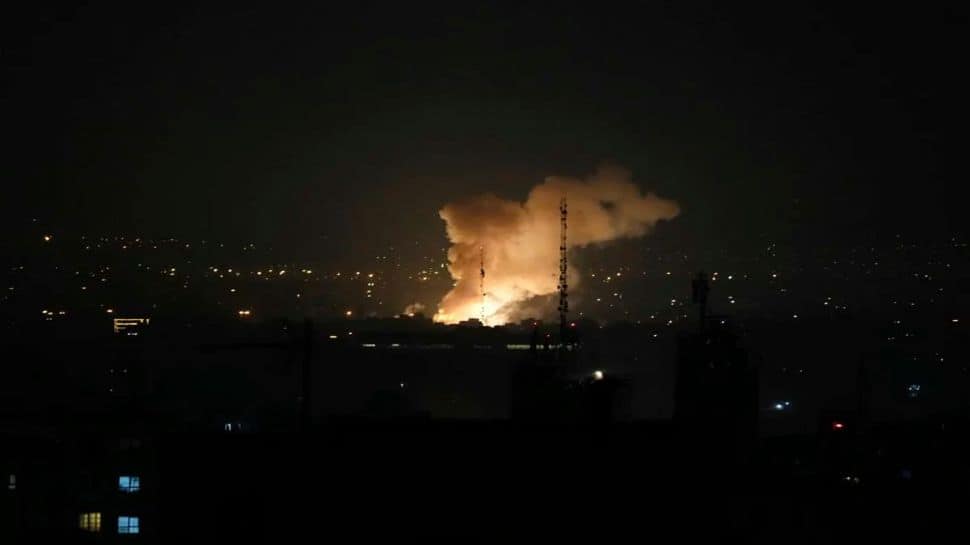Tehran/New Delhi: The night sky cracked open with thunderous booms. From rooftops to boulevards, people across the Iranian capital looked up in panic. Explosions lit up Tehran’s skyline in the early hours of Friday. The smoke trails were not fireworks. According to multiple sources and later confirmed by IRNA, Iran’s official news agency, Israel had begun what many feared – a direct military strike on Iran.
But what if Iran had seen this coming all along?
Behind the drama of a surprise Israeli assault lies a darker and quieter buildup – one that unfolded through coded warnings, intelligence coups and quiet evacuations. This is not a sudden attack. It is rehearsed in shadows, and Iran, it turns out, was not in the dark at all.
Just days before the attack, Press TV published an exclusive conversation with a senior Iranian security official. His words were not vague: “We have intelligence superiority. If Israel or the United States attacks, they will be caught off-guard.”
Speaking to Press TV, a senior Iranian security official warned that the Islamic Republic will surprise the US and Israel if they attempt any aggressive actions.
Follow Press TV on Telegram: https://t.co/boCY50qfi9 pic.twitter.com/Vqil9SykyK
— Press TV (@PressTV) June 12, 2025
That was not bravado.
According to reports, Tehran had intercepted thousands of secret documents from Israeli servers. These files were not mere scraps of information. They included detailed layouts of Israeli nuclear sites, plans of future operations and, perhaps most shockingly, proof that the International Atomic Energy Agency’s top boss, Rafael Grossi, had been working hand-in-glove with Tel Aviv.
Iran’s Intelligence Minister Esmail Khatib called it “a treasure trove”. These documents, he said, contain so much classified detail that calling them “thousands” might actually understate it.
“They include nuclear blueprints, coordination with foreign countries and surveillance maps,” he added.
In simpler terms, Iran now knows where to hit and how hard.
Documents released by Iran show that IAEA chief Grossi has been completely coordinated with Israel and has been carrying out Israel’s orders.
Iran recently managed to obtain a wealth of secret documents from the Israeli regime. pic.twitter.com/iVz2V0oNh5
— Press TV (@PressTV) June 12, 2025
Even as Israeli media speculated about a potential strike, Iran was not scrambling; it was positioning.
At least five rounds of indirect negotiations with Washington had quietly been taking place in Muscat since April. Still, behind those talks, Iran’s military was shifting into high gear. An unnamed official told Press TV that Iran’s forces had reached their “highest level of readiness” not only in air defense but across cyberwarfare, missile units and strategic command.
A two-ton warhead ballistic missile had just been successfully tested, confirmed by Defense Minister Brigadier General Amir Nasirzadeh.
Meanwhile, on Iran’s southern front, Ansarullah in Yemen, already in combat with Israel over Gaza, made its own intentions clear. Speaking to Newsweek, a senior leader from the resistance group said they were at “full alert”. The reason? “Any escalation against Iran will drag the entire region into the abyss of war,” he said.
That is not rhetoric. It is a war declaration waiting for its cue.
And while U.S. troops were being discreetly evacuated from embassies and bases in Bahrain, Kuwait and the UAE, Iranian missiles were likely being calibrated to new coordinates.
With Iranian soil now under open attack, the question has shifted from “if” to “how” Tehran will respond. But according to Tehran’s Supreme National Security Council (SNSC), there is no ambiguity.
“If Israel carries out aggression, we will strike their secret nuclear facilities,” reads their pre-strike statement.
Iran believes it now has real-time intelligence to make those strikes accurate and devastating. According to IRGC Commander Hossein Salami, the purported Israeli documents will be used to plan any future missile attacks.
And that could mean this war does not stay between Iran and Israel for long.
As IRNA reported the blasts over Tehran, Israel simultaneously declared a national emergency. That is a clue. Tel Aviv knows what might be coming not just from Iran’s territory, but from Yemen, from southern Lebanon, from Iraq and even possibly from Syria. Every group aligned with Iran is now likely to interpret Israel’s move as an attack on the region.
Meanwhile, the already fragile diplomatic bridge between Washington and Tehran has likely collapsed. Talks scheduled in Oman now look futile.
President Masoud Pezeshkian said Iran never intended to build nuclear weapons but also warned that Tehran’s scientific and defensive capabilities won’t be surrendered.
It is easy to say this began when missiles flew over Tehran. But the first shots were fired long ago through assassinations of Iranian scientists, alleged leaked intelligence and covert sabotage.
What happened on Friday is just the visible part of a hidden war. The alleged classified documents Iran now holds have altered the balance. The evacuations by the United States were not a precaution; they were an admission. Israel made the first move but Iran may own the next play.
And if that response is as calculated as Tehran’s intelligence game has been so far, the world may soon witness a conflict far broader and bloodier than anyone in Tel Aviv or Washington expected.





